
ALL THAT REMAINS – Not Fading Away
Anthony Morgan
November 2012
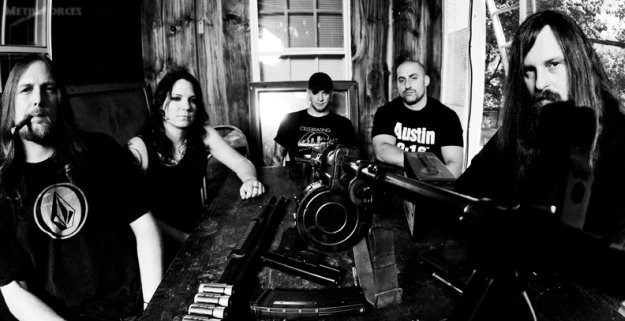 All That Remains (l-r): Jason Costa, Jeanne Sagan, Phil Labonte, Mike Martin and Oli Herbert |
![]()
Springfield, Massachusetts-based metalcore outfit All That Remains began authoring material for a sixth studio full-length shortly following an 18-month touring schedule, a touring period which was in support of October 2010 outing For We Are Many. “Off and on” writing sessions lasted roughly two months, recording sessions taking about a month or so at the group’s home studio. Generally speaking though, writing sessions don’t follow a set pattern.
“Sometimes we write some things on the road, and Oli (Herbert, lead guitars) will program something into the computer,” shares Jason Costa, drummer for All That Remains. “Other times the night before someone will come in, and be like ‘I wrote something last night, and was wondering if you guys wanted to turn it into a song?’ And so we do. We don’t put a time limit or time constraints on it, really. Some bands take a lot longer though. This one seemed to happen a little faster than normal, but that could also be just me (laughs).”
Lead guitarist Oli Herbert composes the bulk of the material. “He’ll then come to the band with some semblance of a song,” the sticksman explains. “It might be a whole song, half a song, or parts of a song like a verse or a chorus. He gets together with all of us, shows us the different parts, and we all sort of work on it. We hammer at it like an anvil. We talk about which riffs should be used for what, and Phil (Labonte, vocals) will see which ones he would rather sing or scream over. Oli then might say ‘This is the bridge, and maybe I’ll wanna do a guitar solo after it or before it.’ I try a whole slew of different drum beats for different parts, and we all figure out together what works better. We all bring stuff in, but Oli has most of the ideas for songs. Mike (Martin, rhythm guitars) and Phil also write – Phil also plays guitar, so he does some of the writing too.”
Much of Jason’s songwriting contributions consist of adding to pre-existing ideas. “There are a few things on different albums that I’ve actually almost written written because they’re just…,” Jason begins. “Like ‘Let Them Tremble’, the first track off of the last album (For We Are Many). Basically, one day I was just sitting at rehearsals. I got there early before anyone else and I was just practising fast patterns of five, just trying to play them at 250bpm. I just kind of put this groovy beat over it, and everyone came up with their parts while I was playing it. We tried like hell to turn it into a song, but it just ended up working better as an intro to the album. With the album before it – Overcome (September 2008) – I wrote the drum beat for ‘Before The Damned’ and they turned that into a song, around that drum beat. That does happen sometimes too. As far as me playing guitar or any other instrument, I don’t play any other instrument. If I hear a melody or something in my head, I can sing it very poorly to the band (laughs). They can translate it to the guitar.”
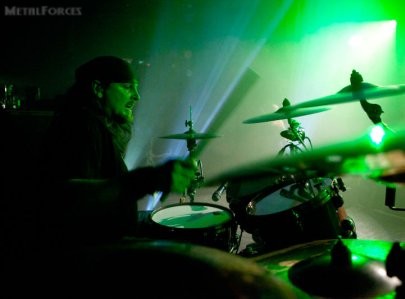
|
All That Remains’ writing predilections reflect their musical tastes. “We don’t try on purpose to write heavy songs, or try on purpose to write radio-oriented songs,” the rhythmist notes. “Everyone’s musical influences in this band are so varied, and it just comes out in our songs. That’s why a lot of our stuff sounds different from one another, like one song going into the next song. We don’t really set parameters for ourselves, like ‘We need to write heavy songs’ or ‘We need to write this radio song.’ We just write, and how it comes out it comes out. Sometimes we write a song, and when we get to the end of writing it we listen back to it. We’re just like ‘Oh, that sucks,’ and then we scrap it completely (laughs). We might work on it, and cannibalise it into another song or whatever.”
Sixth studio full-length A War You Cannot Win underwent issue during November 2012. “This is a very guitar, very melody-oriented album,” Jason critiques. “It wasn’t very rhythm-based at all. I would just say it’s metal; it’s a metal album. We’ve got some heavy songs on there, some heavy, groovy songs on there. We’ve got some fast, heavy songs on there, we’ve got some more radio-friendly, melodic songs on there. It’s typical All That Remains really, but we’ve definitely stepped up the musicianship there and the writing. It’s becoming more polished, a bit more refined. I’ve been in the band for six years now, so the band’s been a solid unit for six years. Whereas there’ve been a lot of membership changes in the past and everything, everyone’s been gelling more. Not that they hadn’t in the past or anything, but getting to know everyone better and the chemistry coming together more and everything just really helps a lot.”
An assortment’s stability or lack thereof affects the resultant output, the skin-beater feels. “At the same time though, there’s also something to be said for sometimes switching members,” he stresses. “I love the band Whitechapel, for instance. I love their last album (June 2012’s Whitechapel) – they’re one of my favourite metal bands. I can tell the difference; they’ve got this new drummer (Ben Harclerode) in the band, and maybe I can tell just because I’m a drummer. He joined the band, and this album that they just put out is different than the last album (June 2010’s A New Era Of Corruption). Sometimes it can work the other way, too. Sometimes it can be a breath of fresh air when a small, slight line-up change happens. Where it’s the most noticeable is either a main writer or a singer leaving. If you lose your singer or switch singers, it’s really hard to come back from that unless the guy really blows doors off.”
Fourth studio record Overcome inaugurated Jason’s tenure. “When I joined, they already had most of the material written for Overcome,” he recalls. “The last album For We Are Many and this album seem to be pretty much the same. There are melodic songs, there are fast songs, and there are heavy songs. It’s kind of the same. It’s not heavier or less heavier, or faster or slower. If you compare all of the songs, they’re pretty much the same. The only album that was ever a little bit different from the rest I would say was The Fall Of Ideals (July 2006), which was written in a very rhythmic kind of way.
“Previously the band had a drummer (Michael Bartlett) that couldn’t play a lot of double-bass on This Darkened Heart (March 2004). When they got Shannon (Lucas) who then joined The Black Dahlia Murder afterwards, they loved the fact that he could play double-bass. They wanted to just have every song with tons and tons of double-bass in it, because they weren’t used to it. It was like a new thing for them to play around with, so they wrote mostly every song around these double-bass patterns. If you go back and listen to that album, most of those songs are written to double-bass patterns. After that though, they didn’t wanna write the same album again. Sometimes kids will come up, and say ‘Why don’t you write another album like The Fall Of Ideals?’ To answer that question, that’s because we already wrote The Fall Of Ideals (laughs).
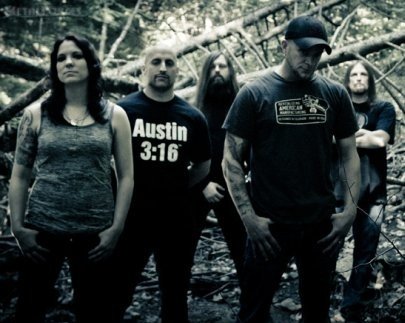
|
“I wasn’t in the band, but when I joined the band I thought it was gonna be like The Fall Of Ideals. I was psyched, because I love playing double-bass. I’m actually one of the people in the band that fights to keep everything as heavy as possible, much to everyone’s dismay sometimes (laughs). That was a little bit different, but now they want to explore other things. Most of the members have been in the band for years and years, so sometimes you don’t wanna play the same thing all the time. It’s nice to branch out, Phil using another style of vocals and Oli and Mike exploring other avenues as far as melodies go in songs, and stuff in different tempos. I know that was an amorphous, vague answer to your question, but that’s how I feel about all that. It’s a big question to ask.”
The percussionist’s musical palette favours “interesting” drum parts. “Sometimes you can’t just write blast-beats and crazy drum parts over everything though,” he cautions. “You’re then ruining the song, and not being a good musician. I actually really do care about how the overall song comes out. I do tend to overplay at first, and everyone says ‘Hey Jase, back off on this’ or ‘… Back off on that.’ I try to get away with what I can get away with on albums though (laughs), because I like to play. I’m hyper. I’m a metal drummer; I love playing metal, I love being hyper, I love playing double-bass, and I like playing blast-beats. It’s just that you can’t always do that.
“Like I said, it’s a group effort when we write. If they feel that there’s too much or that I’m taking away from the melody or the singing part because I’m doing too much behind the drums, then they’ll say to me ‘Hey man, do you wanna try to back off a little bit?’ Then we’ll try it, and then we’ll listen to it. It’s not like a demand, or anything like that. Everyone always asks to try something first, and then we’ll listen to it and go ‘Okay…’ I want to have the most intense drum parts I can on there, but you can’t just slather double-bass and blast-beats over everything all of the time. It just doesn’t work that way.”
A wide array of influences inform Jason’s drumming. “I grew up with a bunch of music nerds,” he remembers. “We would sit around with tape players – that’s how old I am – and CDs, and take apart a lot of the Shrapnel recordings. Shrapnel recordings like Marty Friedman doing his own thing on Dragon’s Kiss (August 1988), and Tony MacAlpine, and Joey Tafolla, and all that. I would say Deen Castronovo and Atma Anur are really big influences on my drumming, and so was Gene Hoglan of course. I’m so psyched to be touring with Dethklok right now, and getting to watch Gene play every night – he’s absolutely phenomenal. There are so many drummers… I know I’m gonna forget a few, and then be bummed out that I forgot a few later on.
“Like Nicko McBrain; I’m a huge fan of Iron Maiden. Slayer of course; Dave Lombardo. He’s such a hyperactive, bombastic thrash drummer. Watching him play live is just phenomenal, because he’s a monster. Then there’s modern day influences like Shannon of course who played with The Black Dahlia Murder of course. When I joined All That Remains I had to play the songs that he had written on for The Fall Of Ideals, so he became a big influence on me. I loved his work with The Black Dahlia Murder when he joined. All of the drummers who’ve been in Whitechapel are an influence, because I love that band. I have a lot of different influences. I listen to a lot of hip-hop and rap too – I have a pretty varied bunch of influences on my drumming (laughs).”
Neither technique or simplism fatique the sticksman. “I don’t pigeonhole myself into one – I can do either,” he observes. “I’ve been playing drums for a long time (laughs). I took drum lessons for ten to 11 years from the same guy, and I really worked hard on drums for a long time. One of the best things my teacher ever taught me was how to learn. A lot of drum teachers will teach you how to do things and how to play a certain way or whatever, but he actually taught me how to learn stuff. Anything that I really need to do, I can. If the band said ‘Hey Jason, we really need you to do this crazy pattern,’ I could do it. I may need a little practice with it, but I never say no. If I needed to learn how to play faster even then I would, but I really don’t want to (laughs). I wouldn’t wanna have to play blast-beats and double-bass at so many beats per minute. I’ll leave that to others because that’s extreme, extreme drumming, and I don’t wanna go to extreme drumming. I’d like to stay and drop out around 230bpm (laughs). The answer to your question though is I can do either.”
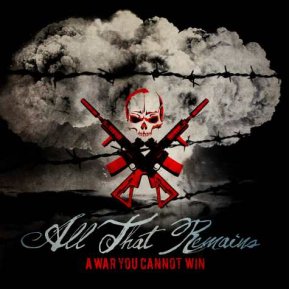
|
The inspiration behind vocalist Phil Labonte’s lyrical scribblings aren’t public record. “Phil likes to leave things a bit vague, so that the listener can interpret the lyrics the way they want,” Jason reasons. “If he says ‘Hey, this song is about this,’ I just think it takes away from the listener’s experience.”
Having produced all but one of All That Remains’ studio endeavours (Overcome), Killswitch Engage guitarist Adam Dutkiewicz lent his expertise to A War You Cannot Win. “He’s just like one of us,” the rhythmist judges. “He’s a big goofball and a lot of fun to work with, but also he’s very, very professional. You can’t just play something kind of shitty, because he won’t let you get away with that. You’ve gotta play, and you’ve gotta play it right. He’s a very diligent, hard worker, and he doesn’t put something he can’t stand behind. At the same time though, he’s a lot of fun to work with (laughs). He pushes you hard; I’ve definitely learnt a lot just from working with him. He was a drummer I think before he was a guitarist; he’s actually a damn good drummer, so he knows what he’s talking about when it comes to drums.”
Directed by PR Brown, a music video was filmed for the composition ‘Stand Up’. “It’s guns and fire, and people shooting in a forest,” Jason chuckles. “The video is left a bit vague. It’s just meant to catch people’s eyes and make them think about things, current events that are going on. “The video was enjoyable to film, but at first it wasn’t because it was raining a lot. It was raining and misting off and on, but the rain and the mist sort of added to the atmosphere of the video. It was one of the quickest videos we’ve ever done. The director was absolutely amazing – he worked so fast and got good shots. That guy really knew what he was doing; he’s probably the best that I’ve worked with.”
Which tracks will be subject to future music videos is uncertain. “That’s something we’re debating at the moment, so I don’t actually have an answer for that,” the skin-beater admits. “I’d like to do the title track though. There are a bunch of songs that are my favourites off of the album, but I really like the title track. If I had to pick one, it’d be that song. The first song that we put out was ‘Stand Up’, and it’s more of a slower type of anthem, kind of groovy song. I think we should maybe put something out that is faster, instead of another song that is more geared for radio. I think variety is good in your music, and in your selection of what you put out.”
All That Remains are currently supporting Dethklok across North America alongside Machine Head and The Black Dahlia Murder, the aforementioned tour package having begun on October 30th at Norva in Norfolk, Virginia and due to conclude on December 8th at Tabernacle in Atlanta, Georgia. “This tour’s been great, yeah,” Jason compliments. “It’s so much fun. I’ve been a fan of all those bands since forever. I know that Dethklok are a more recent band, but Machine Head I’ve been a fan of since I was younger. The Black Dahlia Murder I’ve been a fan of since their first album, and Dethklok are absolutely fantastic. One of my favourite drummers ever is in that band – the guys in that band are all phenomenal. The shows have been fantastic; they’ve all been sold out or close to sold out. We’re not the heaviest band on this tour, but everything’s going good man.”
Live reception towards A War You Cannot Win’s material has been favourable, the percussionist gauges. “It’s been good,” he surmises. “Most of the time when you play brand new stuff that just came out that month or is about to come out, most of the fans just stand there and they take it all in.”
All That Remains’ live performances are characterised by the band’s lighthearted nature. “We’re a bunch of goofballs – we goof around a lot live,” Jason enthuses. “We’re not one of these bands that puts pigs’ heads on sticks, and tries to be as metal as possible. We’re a bunch of nerds in this band; we laugh onstage, and make fun of each other a lot. We bust each others balls constantly in this band, but it’s all in good fun. We really have a good time while we play, and I would hope that I add to that because I definitely enjoy playing around.”
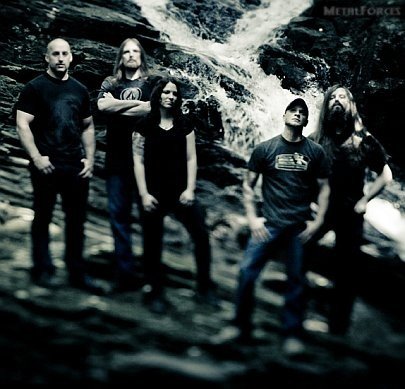
|
Frontman Phil Labonte doesn’t hold touring the European continent in high esteem, expressing the following comments in an interview: ‘If we never went to Europe again, I really couldn’t care much.’ “I’m not sure what comments he has made, but there are two people in this band who don’t mind touring Europe,” the drummer emphasizes. “If they didn’t have to they wouldn’t though, because they like staying in the US. There are three other people in this band mind – me being one of them – who like going out of the country. I like touring other places around the world, and I really do enjoy touring Europe. I think the people there are great, and the music that comes out of there – the bands who come out of Europe are great. I don’t mind touring Europe at all.
“Phil’s kind of a hermit though. He likes to stay at home, and likes to be around things that he’s familiar with. That’s just him. Just because you’re in a band doesn’t mean you’re not subject to the same sort of mental issues that everyone else in the world is (laughs). You’re still a human being, and you’re still gonna have your opinions and stuff like that. He’s not saying that to be mean. He’d really rather be home around things that he’s more familiar with, and be able to read street signs and understand people rather than have to filter something through an accent. He’s not being a jerk by saying that; he’s just being honest.”
“We’re definitely going to tour Europe still. If he didn’t wanna go to Europe, he’s our singer. We couldn’t just go without him, so we’ll be in Europe soon and that’s proof positive that fans shouldn’t take that at all in any personal way.”
Phil nonetheless harbours warm feelings towards All That Remains’ European fanatics, Jason contends. “Are you kidding me?,” he poses. “What he thinks are our best shows ever are… I can’t remember… Like Malmö (Sweden), and Finland. We’ve had some amazing, amazing shows over there, and he’s gotten offstage glowing, saying ‘Oh my God. That was the best show ever.’ It’s the fans that make it the best show ever.”
European musicians touring North America arguably share similar feelings to North American musicians touring Europe, enduring bouts of homesickness. “Yeah, of course,” the sticksman agrees. “And not for nothing. I like going over there, but it’s easy for me to get homesick while I’m over there. I don’t let it bother me on tour or anything like that, but yeah, I do get homesick. I even get homesick sometimes if we’re doing a long tour like this tour of America right now. I’m a lot different than Phil though; Phil just likes to play the show, go back to the bus, hang out, and watch TV and everything. I like to go out a lot, and that’s one of the reasons why I enjoy Europe. After the show, I like to hit the bar and say ‘Hi’ to the kids and the people and stuff, and see what’s going on there. I’m not from there, so it’s interesting. Jeanne’s (Jeanne Sagan, bass) the same way, and Oli’s the same way.”
A War You Cannot Win was released on November 6th, 2012 via Razor & Tie Records.
Interview published in November 2012.





